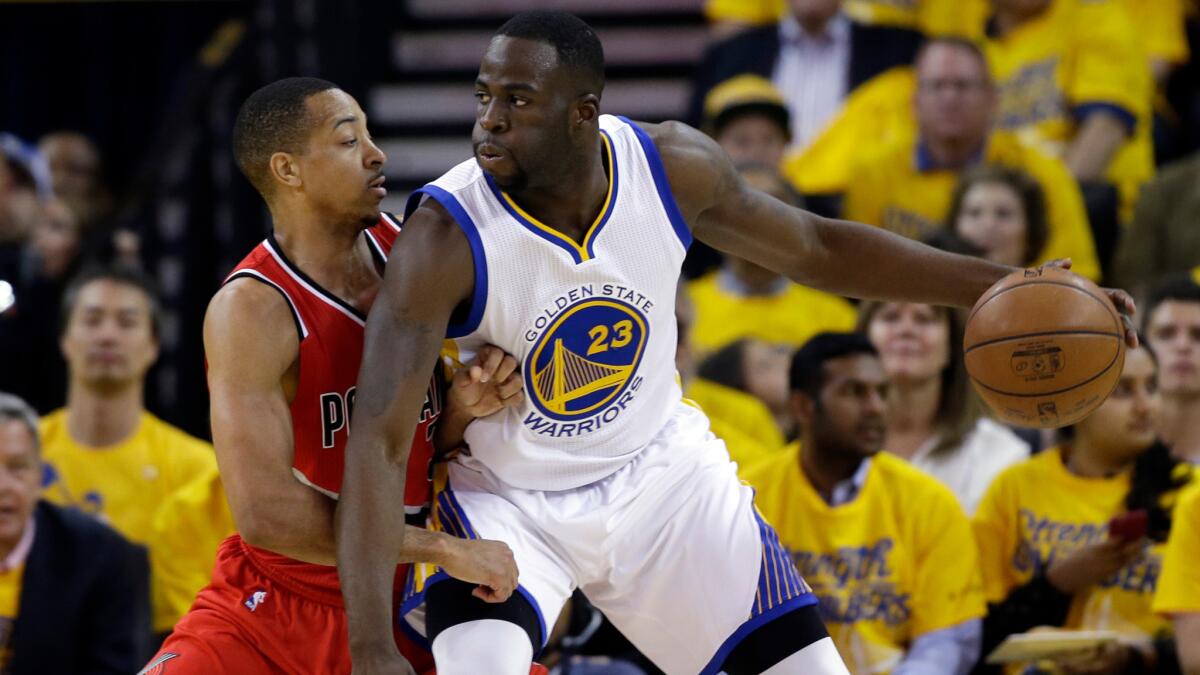Op-Ed: The secret to the Warriors’ success

- Share via
The secret to the Golden State Warriors’ phenomenal success lies in point guard Stephen Curry. At least that’s the conventional wisdom. He made 402 three-point shots in the 2015-16 NBA regular season, breaking his own record of 286, set the year before, which broke his previous record set in 2012-13. Extrapolating from current trends, he will make 87,366 three-pointers in 2050-51. Curry’s 402 threes is comparable to a baseball player hitting more than 100 home runs in a single season, according to fivethirtyeight.com, or a hummingbird pollinating 1,400 flowers in a single day, according to an analysis I recently completed in conjunction with the “Old Farmer’s Almanac.”
All these statistics reveal what you can see with your own eyes: Curry is a unique talent. But if Curry is the one player indispensable to the Warriors’ success, why did basketball fans spend Monday obsessing over whether forward Draymond Green would be suspended for kicking Oklahoma City’s Steven Adams in the groin? Shouldn’t they have felt confident that Curry, who put in a typically fine performance on Sunday, could lead the team to victory in the playoffs?
Fans ... are finally realizing that the Warriors’ championship ways have less to do with Curry than with the team dynamic, which is well outside the NBA norm.
Fans, consciously or unconsciously, are finally realizing that the Warriors’ championship ways have less to do with Curry than with the team dynamic, which is well outside the NBA norm.
Golden State has a superstar in Curry, the two-time MVP, and a semi super-star in shooting guard Klay Thompson. Both ooze confidence and both celebrate their personal achievements, yet neither is the obvious team leader. That figure on the floor, emotionally and often tactically, is Green.
Nicknamed Dancing Bear, Green is tall enough to guard power forwards, and fast enough to switch and cover guards behind the three-point line. Every night, he’s a triple double waiting to happen, leading his team in rebounding, assists and minutes, while shooting threes at just under 40%. But as fantastic a player as he is, he is not the best player on this team, not even the second best.
On virtually every other NBA team, and I covered a few as a writer for Sports Illustrated, the best player is also the team’s leader, the big dog is the alpha dog. Look at the Lakers, who won three titles with Shaq in that dual role, and then fell apart as Kobe Bryant came into his own and attempted a putsch. It took a half-decade to build another championship team with Bryant as the undisputed leader and best player. This just completed Laker season was so dreadful in part because Bryant, still the undisputed leader, had deteriorated as a player but out of respect or fear, none of the team’s younger players were ready to challenge him.
Think of any NBA superstar, Magic Johnson, Michael Jordan, Bill Russell, Larry Bird, Julius Erving, LeBron James, even Kevin Durant — each was or is his team’s best player and leader.
In nature, the pack is led by the big dog, who also barks the orders. (Remember “Call of the Wild?” Buck had to kill Spitz to become the lead dog.) And sports teams, based as they are on elemental attributes like speed, strength and coordination, tend to fall into the same pattern. To the strongest goes the lead position.
Nevertheless, Golden State’s unusual structure makes sense. If you take away the responsibilities of firing up your guys, reminding players where they are supposed to be on the floor, or wagging a finger at an ill-advised shot, doesn’t that free the superstar to do what he does best, make a ridiculous number of three-point baskets? It does. And this is actually how corporate America operates. Apple doesn’t take their best programmer and make him CEO of the company. It’s understood that the editor of a newspaper is not the best writer in the building. Separating the alpha- from the big-dog responsibilities is also what made the Hole in the Wall Gang so formidable in “Butch Cassidy and the Sundance Kid.” Butch was the leader, but Sundance was the best gunman.
On the Warriors, Green is the leader of the gang, but there really isn’t any gang without Curry and his fellow gunslingers, which gives Golden State a psychological edge. Say an opponent slows down Curry — he has a bad quarter every now and then — you still have the alpha dog behind him, barking orders, making sure the team’s morale never dips.
Green’s value became obvious a couple of weeks ago. Due to a pair of injuries, Curry was unable to complete any of the Warriors’ first eight playoff games, but Green was fired up and healthy. The team managed to win six of those eight games. I found myself wondering if the team could have managed the same string without their leader. Sunday night suggested the answer was no.
While Steph Curry is the MVP of the entire league, Draymond Green just may be the MVP of this team.
Karl Taro Greenfeld is a former writer for Sports Illustrated and co-author of “Dr. J: The Autobiography.” His most recent novel is “The Subprimes.”
Follow the Opinion section on Twitter @latimesopinionand Facebook
More to Read
A cure for the common opinion
Get thought-provoking perspectives with our weekly newsletter.
You may occasionally receive promotional content from the Los Angeles Times.










